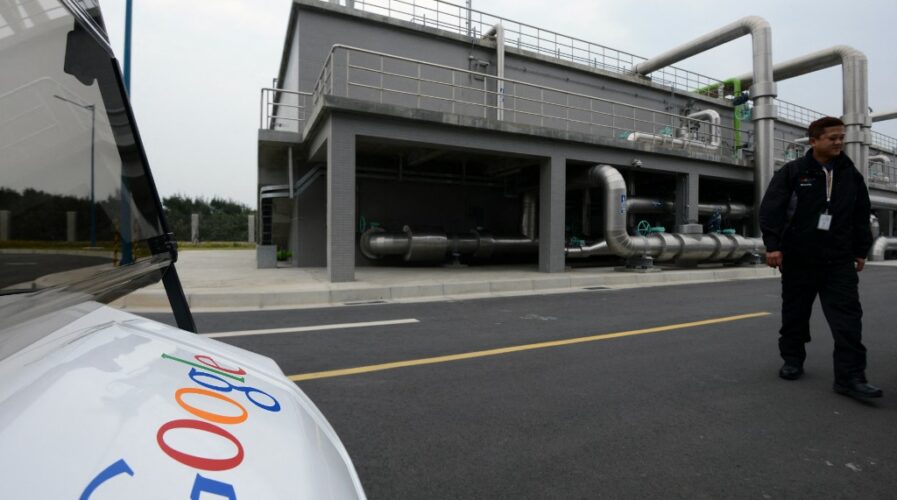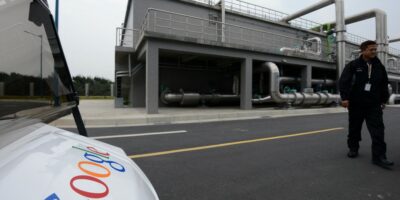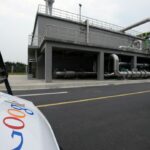
The data centers of the future would run on battery power. Photo by Sam YEH / AFP
The data centers of the future will run on batteries
- Datacenter operators rely on diesel generators despite the increased efficiency of battery power and renewable energy
- Last year, a Google data center team in Belgium started using lithium-ion batteries instead of a diesel generator as power backup for 3MW of live, production computing load – a first for the search giant
Data centers — cavernous warehouses filled with computers and cables that keep websites and apps running around the clock — are the beating heart of the internet. They are also huge consumers of energy, and as the world spends more time online, environmentalists are growing increasingly concerned about their climate impact. Thankfully, tech giants are leading the big shift, which likely involves having data centers run on battery power.
Search engine behemoth, Google, last month announced that it would be installing batteries to replace some of the diesel generators that provide backup power at its data center in Saint-Ghislain, Belgium — a first for the company. The move is more than a routine upgrade from old, dirty equipment to new, cleaner technology. When Google isn’t using the batteries, it plans to supply some of its energy to the local electric grid. If the experiment is successful, data centers equipped with batteries that store renewably generated power could one day become “critical components in carbon-free energy systems,” Google’s VP of global data centers, wrote in a blog post.
As it is, data centers take up about one percent of global electricity usage, a figure that could rise as data-intensive activities like video streaming and cloud gaming become more popular and as more people around the world gain access to the internet. Hence, when data centers are powered with fossil fuel energy like coal and natural gas, these facilities can have a serious climate impact. As environmental groups started calling out Big Tech for all of this unseen pollution, image-conscious companies like Google and Microsoft began making an effort to clean up their data centers’ power supply.
Mainly, Google hopes to demonstrate that batteries are a viable replacement for traditional data center backup generators, and that a data center outfitted with a large-scale energy storage plant can help balance its local electrical grid. Most importantly, the tech giant expects the project to send a signal to the market that batteries are now a mature technology for large-capacity energy storage at scale.
Microsoft, one of Google’s two biggest rivals in the cloud computing market, has been trying to figure this out since at least 2012 and earlier last year committed to ending its “dependency on diesel fuel by 2030.” Within the same year, Microsoft announced a successful test for powering a data center rack with a hydrogen-fueled automotive fuel cell, looking at the technology as one of the potential replacements for diesel generators.
Batteries and smart energy
One of the most significant advances of the past several years is the maturing — technically and economically — of the Li-ion battery. From 2010 to 2018, the cost of Li-ion batteries (in $ per kWh) fell 85%, according to Bloomberg-New Energy Finance. Most analysts expect prices to continue to fall steadily for the next five years, with large-scale manufacturing being the major reason. That’s why the allure of data center batteries is so strong.
Researchers at the University of Washington studied a Microsoft data center to see whether its battery system could be used for dual purposes like data center backup and grid services. They concluded the company could cut its annual electric bill by nearly 11% by reducing energy use at times of peak demand and, at the same time, gain a new revenue stream by offering services to the grid.
To be sure, there are limits to what battery technology can provide in its current form. A data center’s backup batteries can only dispatch power for a matter of minutes, making them a potential solution for short-term fluctuations in electricity, but less of an option for long-term storage. It is early days, but major operators like Google, manufacturers, and startups alike are all looking at how they can use Li-ion storage, combined with multiple forms of energy generation, to reduce their reliance on generators.
Perhaps this should not be seen as the direct replacement of generators with Li-ion storage, since this is not likely to be economic for some time, but rather the use of Li-ion storage not just as a standard Uninterruptible Power Supply (UPS), but more creatively and more actively.
READ MORE
- Ethical AI: The renewed importance of safeguarding data and customer privacy in Generative AI applications
- How Japan balances AI-driven opportunities with cybersecurity needs
- Deploying SASE: Benchmarking your approach
- Insurance everywhere all at once: the digital transformation of the APAC insurance industry
- Google parent Alphabet eyes HubSpot: A potential acquisition shaping the future of CRM


